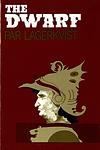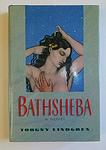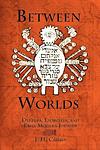The Greatest Swedish, Russian "Drama, Fiction" Books Since 1910
Click to learn how this list is calculated.
This list represents a comprehensive and trusted collection of the greatest books. Developed through a specialized algorithm, it brings together 305 'best of' book lists to form a definitive guide to the world's most acclaimed books. For those interested in how these books are chosen, additional details can be found on the rankings page.
Genres
Drama is a genre of literature that typically deals with serious and emotional themes, often exploring the complexities of human relationships and the struggles individuals face in their lives. These books often feature intense character development and intricate plotlines, delving into the depths of human experience and the challenges of navigating the world around us. From family dramas to political intrigue, the drama genre encompasses a wide range of stories that aim to captivate readers with their raw and powerful storytelling.
Countries
Date Range
Reading Statistics
Click the button below to see how many of these books you've read!
Download
If you're interested in downloading this list as a CSV file for use in a spreadsheet application, you can easily do so by clicking the button below. Please note that to ensure a manageable file size and faster download, the CSV will include details for only the first 500 books.
Download-
1. The Dwarf by Par Lagerkvist
"The Dwarf" is a dark, philosophical novel set in the Italian Renaissance, narrated by a malevolent court dwarf who serves a prince. The dwarf is a symbol for the darker side of humanity, embodying all the malice, deceit, and manipulation that one can possess. His actions and viewpoint provide a cynical commentary on human nature and the moral complexities of power, war, and love. The novel explores themes of good and evil, faith and doubt, and the destructive side of human nature.
The 1024th Greatest Book of All Time -
2. The Clay Machine-gun by Victor Pelevin
"The Clay Machine-gun" is a surreal and complex novel that explores the nature of reality and illusion. The story is set in post-Soviet Russia and follows a protagonist who has multiple identities, including a poet in 19th-century Russia, a 20th-century psychiatric patient, and a 21st-century advertising executive. The narrative moves between these identities and realities, blurring the lines between them and creating a layered and philosophical exploration of Russian society, identity, and the human psyche.
The 2276th Greatest Book of All Time -
3. The Bedbug And Selected Poetry by Vladimir Mayakovsky
"The Bedbug And Selected Poetry" is a collection of poems by Vladimir Mayakovsky, a prominent Russian poet of the early 20th century. The book features a mix of Mayakovsky's avant-garde and politically charged works, showcasing his unique style and themes of revolution, love, and the struggles of the working class. Through his powerful and dynamic verses, Mayakovsky offers readers a glimpse into the social and cultural landscape of his time, while leaving a lasting impact with his thought-provoking and emotive poetry.
The 2286th Greatest Book of All Time -
4. The Serious Game by Hjalmar Soderberg
"The Serious Game" is a profound narrative about love and regret, following the lives of two individuals, Arvid Stjärnblom and Lydia Stille, who first meet as teenagers and fall in love. However, societal expectations and personal circumstances lead them to marry other people. Despite their respective marriages, they continue to meet throughout their lives, unable to let go of their love for each other. The novel explores the complexities of love, the choices we make, and the consequences that follow, painting a poignant picture of human relationships and the often tragic game of love.
The 2720th Greatest Book of All Time -
5. A Burnt Child by Stig Dagerman
The novel delves into the psychological turmoil of a young man grappling with the complexities of adulthood and the haunting specter of his father's death. As he navigates the murky waters of guilt, desire, and rebellion, he becomes entangled in a web of relationships that challenge his understanding of love, morality, and his own identity. Set against the backdrop of post-war Sweden, the story is a poignant exploration of grief, the struggle for self-discovery, and the painful journey towards coming-of-age in a world that seems both indifferent and unforgiving.
The 2948th Greatest Book of All Time -
6. Bathsheba by Torgny Lindgren
"Bathsheba" is a dark and humorous tale set in a remote Swedish village plagued by a mysterious illness. The narrative follows the village's school teacher who, despite being the only one unaffected by the disease, is ostracized by the community. The arrival of a beautiful and enigmatic woman named Bathsheba stirs up the village, particularly the teacher who becomes infatuated with her. The novel explores themes of love, lust, faith, and the human condition, encapsulated in a captivating and surreal narrative.
The 3240th Greatest Book of All Time -
7. Women And Appletrees by Moa Martinson
The book is a poignant exploration of the lives of rural Swedish women in the early 20th century, focusing on their struggles, relationships, and the societal expectations that confine them. Through the lens of various female characters, the narrative delves into themes of poverty, motherhood, and the pursuit of independence. The women's connection to the land and the symbolic presence of apple trees serve as a backdrop to their stories, highlighting their resilience and the cycles of life that both challenge and sustain them. The novel is a testament to the author's feminist perspective and her own experiences as a working-class woman, offering a vivid portrayal of the hardships and triumphs that shape these women's existences.
The 3469th Greatest Book of All Time -
8. Christmas At The Ivanovs' by Alexander Vvedensky
"Christmas at the Ivanovs'" is a satirical play that delves into the absurdities of Soviet life during the early 20th century. The narrative unfolds during a Christmas celebration at the Ivanov family's home, where a series of bizarre and surreal events take place. The characters, including a detective, a poet, and various family members, engage in nonsensical dialogues and actions, reflecting the author's avant-garde approach to theater. The play critiques the disconnect between the state's ideological propaganda and the grim realities of everyday life, using dark humor and chaotic scenes to challenge the audience's perception of normalcy and rationality within a society under strict political control.
The 3798th Greatest Book of All Time -
9. The Zone by Sergei Dovlatov
"The Zone" is a semi-autobiographical novel that follows the life of a writer who is confined to a Soviet labor camp. Through a series of vignettes, the protagonist reflects on his experiences in the camp, the absurdities of the Soviet system, and the struggles of maintaining his identity and integrity in the face of oppression. With dark humor and sharp observations, the book offers a poignant and satirical portrayal of life in the Soviet Union.
The 4082nd Greatest Book of All Time -
10. Farewell To Matyora by Valentin Rasputin
The book is a poignant exploration of the tension between progress and tradition, set in a small Siberian village that is doomed to be submerged by the construction of a hydroelectric dam. As the government mandates the relocation of the village's inhabitants, the narrative delves into the lives of the villagers who are grappling with the loss of their ancestral home and way of life. The story is a meditation on the cost of modernization, the deep connection between people and their land, and the inevitable passing of time that brings change, often at the expense of cultural heritage and personal identity. Through the villagers' resistance and sorrow, the novel examines themes of environmental impact, the clash of ideologies, and the resilience of the human spirit in the face of displacement.
The 4094th Greatest Book of All Time -
11. The Dybbuk by S. Ansky
The book is a seminal work in Yiddish literature and folklore, centering around the concept of a dybbuk—a malicious possessing spirit from Jewish mythology. The narrative follows the tragic tale of a young bride in a Polish shtetl who becomes possessed by the restless spirit of her dead lover, who had been wronged by his own father and her father's broken pledge. The possession leads to a dramatic exorcism and a series of events that explore themes of love, betrayal, and the clash between the mystical and the rational, as well as the boundaries of life and death. The story delves into the rich tapestry of Jewish mysticism, community, and tradition, reflecting the cultural and religious tensions of Eastern European Jews before the First World War.
The 4478th Greatest Book of All Time -
12. The Time: Night by Ludmila Petrushevskaya
The book is a stark portrayal of the struggles faced by a multi-generational family living in the cramped quarters of a Moscow apartment during the twilight years of the Soviet Union. The narrative is driven by the matriarch, a poet who is both resilient and weary, as she navigates the complexities of caring for her mentally unstable daughter and her neglected grandson. The story delves deep into themes of maternal sacrifice, poverty, and the relentless passage of time, painting a grim picture of domestic life and the burdens of womanhood in a society that is as unforgiving as it is oppressive.
The 5514th Greatest Book of All Time -
13. The Major Plays by Anton Chekhov
This collection brings together the most significant works of a master playwright whose stories unfold against the backdrop of Russian society at the turn of the 20th century. The plays are rich with complex characters, nuanced relationships, and social commentary, exploring themes of unrequited love, dreams versus reality, the passage of time, and the search for meaning in everyday life. The playwright's signature blend of tragedy and comedy, combined with a subtle use of symbolism and a focus on character development, has cemented these works as timeless explorations of human nature and the societal pressures that shape our lives.
The 7193rd Greatest Book of All Time -
14. Zuleikha by Guzel Yakhina
"Zuleikha" is a captivating historical novel set in 1930s Soviet Union, following the life of Zuleikha, a Tatar woman who is forcefully taken from her home and exiled to Siberia. As she struggles to adapt to the harsh conditions of the remote village, Zuleikha finds solace in her resilience and the unexpected connections she forms with her fellow exiles. Through her journey of survival, love, and self-discovery, Zuleikha's story beautifully explores themes of identity, freedom, and the indomitable human spirit.
The 8248th Greatest Book of All Time -
15. A Man Called Ove by Fredrik Backman
The book centers around a curmudgeonly widower whose strict routines and grumpy demeanor hide a deep sadness after the loss of his wife. His solitary existence is disrupted when a boisterous young family moves in next door, leading to a series of comedic and heartwarming events that gradually thaw his icy exterior. Through these interactions, the protagonist's past is revealed, and he forms unexpected friendships that give him a new lease on life, showing that even the most steadfast loner can find community and purpose when least expected.
The 8382nd Greatest Book of All Time -
16. The Suicide by Nikolai Erdman
"The Suicide" is a darkly comedic play centered on a man who, overwhelmed by the absurdity and struggles of life under a repressive regime, contemplates ending his life. His intentions quickly become public, drawing the attention of various interest groups who seek to exploit his despair for their own ideological ends. Each group wants to make his death a statement for their cause, turning the man's personal crisis into a public spectacle. The play satirically explores themes of individual agency, societal pressures, and the manipulation of personal tragedies for political gain, ultimately questioning the value of life in a society that prioritizes propaganda and collective ideology over the individual.
The 11014th Greatest Book of All Time
Reading Statistics
Click the button below to see how many of these books you've read!
Download
If you're interested in downloading this list as a CSV file for use in a spreadsheet application, you can easily do so by clicking the button below. Please note that to ensure a manageable file size and faster download, the CSV will include details for only the first 500 books.
Download














